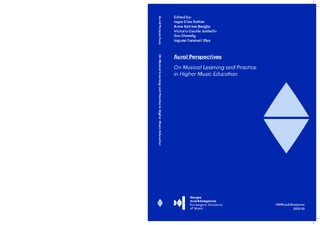| dc.description.abstract | In this anthology, five Norwegian and two Finnish music educators explore various aspects of aural skills awareness and musical aural training in higher music education. The first three articles focus on aural perspectives in a progressive line: from applicant, to student, to professional musician. The following three articles deal with learning strategies that may be helpful in acquiring and perfecting aural awareness and skills. Lastly, six selected sight-singing textbooks for choral singers are presented. Read together, this anthology provides insight into different aspects of the musical ear – as a phenomenon, as a discipline, and in function. - . - . -
Introduction. -
This anthology ends the GEFFF project at the Norwegian Academy of Music (NAM). GEFFF is an acronym for the Norwegian title, Det musikalske gehøret – som fenomen, fag og funksjon, “The Musical Ear, as a phenomenon, as a discipline, and in function. This refers to three key areas connected to Aural Training in higher music education: the psychological, the pedagogical and methodological, and how aural training is linked to the general development of musicianship in any study programme and music profession. The GEFFF project started in 2007, when six colleagues at NAM joined to create a professional team, with the intention to launch different research projects within the aural domain. Until recently, aural training teachers were mainly concerned with practical teaching and the development of methods and textbooks. The GEFFF team’s main aim was to establish aural domains as a research field, in order to understand, develop and give reasons for the practice. Working within the team turned out to be very fruitful and inspiring, as the members learned from and supported each other. This team functioned until autumn 2012, when the GEFFF project ended with a three day Nordic conference at NAM. In addition to Nordic delegates, there were participants from the USA, England, South-Africa, Austria, and Germany. All delegates contributed professionally at the conference. This anthology consists of contributions by three of the GEFFF members (AnneKatrine Bergby, Ingunn Fanavoll Øye, Inger Elise Reitan) and four other GEFFF Conference participants. The first three articles serve to frame the progression from applicant, through student, to professional musician, in relation to the aural field. The next three articles deal with learning strategies, in one way or another, and finally, a presentation of textbooks for choral aural training. | nb_NO |
